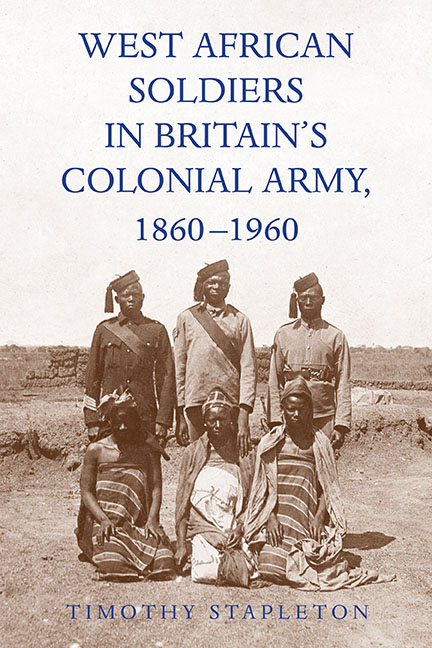Book contents
Introduction
Published online by Cambridge University Press: 07 October 2022
Summary
Like Britain's “Tommy” or America's “G. I. Joe,” the West African men who enlisted in Britain's colonial army gained popular nicknames in their region. The most common was “Waffs,” which was taken from the abbreviation for West African Frontier Force (WAFF), later renamed Royal West African Frontier Force (RWAFF), comprising the umbrella military structure in British West Africa during the early and mid-twentieth century. Soldiers from the Sierra Leone–based West African Regiment (WAR), the only locally recruited British Army unit in the region to stand outside the WAFF framework, received the moniker “Wars.” Other territorially oriented labels included Sierra Leone's “Frontiers” originating with the territory's Frontier Police of the 1890s, which morphed into part of the WAFF and the Gold Coast's or Ghana's “Abongo” derived from a popular Second World War–era army marching song about fictional soldier Corporal Abongo Frafra. While most of these nicknames disappeared along with the colonial titles of military institutions, Abongo continued to hold meaning in postcolonial Ghana where it became a derogatory term for uneducated men who became soldiers due to limited opportunities. The fact that people in British colonial West Africa referred to soldiers by these nicknames speaks to the military as a well-known element of society at that time but also to the existence of stereotypes about men in uniform. Nevertheless, the troops who bore these sobriquets have become obscure figures in West African and military history.
The men known as Waffs and Wars, Frontiers, and Abongos comprised Britain's largest military force in colonial sub-Saharan Africa. During peacetime, the Nigeria Regiment alone equaled or outnumbered the entire King's African Rifles (KAR), an equivalent force based in Britain's East African colonies. With London's thrifty approach to empire and the prevalence of tropical disease in West Africa mitigating against the large-scale employment of metropolitan troops, British colonial conquest and military occupation in the region depended heavily on locally recruited soldiers. From Britain's large and populous colonies like Nigeria and the Gold Coast to the smaller territories of Sierra Leone and the Gambia, West African troops, led by a few British officers and noncommissioned officers (NCOs), maintained colonial rule. Britain's West African soldiers suppressed local uprisings and discouraged potential rebels, and their uniformed and armed presence served as an important symbol of colonial authority.
- Type
- Chapter
- Information
- Publisher: Boydell & BrewerPrint publication year: 2021

